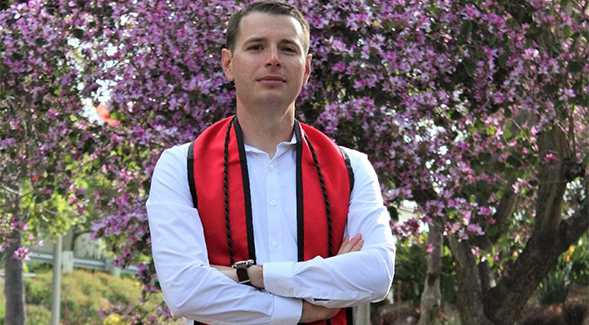
Eric Monette wearing a veteran’s cord for his graduation pictures.
Friday, June 07, 2019
SDSU Student Finds Mentorship and Direction While on Campus
U.S. Air Force veteran finds a way to continue serving his country while studying at SDSU.
After serving in the United States Air Force and completing a tour in Afghanistan, Eric Monette decided it was time to leave the military and move into civilian life. He quickly learned it wasn’t as easy as he expected.
“I initially believed that my experience from the military would be all I needed to get a fulfilling and well-paying networking job,” said Monette, who worked with the Air Force’s network infrastructure and E3 Sentry systems during his service. “After a few interviews, it was clear that I was wrong, and it was then I realized that finishing my degree would be critical to my future.”
While working toward his bachelor’s degree in anthropology at San Diego State University, Monette took a management information systems course and “it reignited my passion for computer networking and technology,” he recalled. “With that, I knew the Master of Science in Information Systems (MSIS) program would be an exciting opportunity.” After graduating with his anthropology degree in spring 2017, Monette wasted no time pursuing his MSIS degree. Three months later, he was back on campus as an SDSU graduate student.
During his MSIS student orientation, Monette learned about a research project for the Naval Engineering Education Consortium (NEEC) from MIS professor, Bongsik Shin. Eventually, Monette earned a spot on the research team, which consisted of Shin; MIS professor, Aaron Elkins; the co-director of SDSU’s homeland security graduate program, Lance Larson: and two other SDSU students.
For the project, the team researched and analyzed specific attributes of various cyber threats and vulnerabilities to create a cyber-threat intelligence model. The model analyzes real-time cyber intelligence and alerts sailors to relevant cyber threats.
The team was set to present their findings to a panel of Naval Sea Systems Command (NAVSEA) engineers during the NEEC Consortium at the Naval Underwater Warfare Center in Keyport, Washington in April 2018. The event was designed to present the Navy with new university-led technologies and to showcase student talent for possible employment by the Department of Defense. However, the three-day federal government shutdown in January of that year created a budget issue for the program and the Navy cancelled the event two weeks before it was scheduled.
Shin wasn’t going to let the project die. He contacted the management teams and recruiters from the two NAVSEA war centers in Southern California and coordinated the presentation at SDSU – all within two weeks’ time.
Shin also arranged for the resumes of STEM students from across the campus to be delivered to the NAVSEA managers and recruiters before their arrival in San Diego.
“Students with STEM-related degrees were offered on-the-spot interviews,” explained Monette. “I think six students were given offers of either full-time employment or internships.”
Monette was one of the students offered full-time employment but the offer came with a catch. Monette had to start work in January of 2019, but he wasn’t slated to graduate until May.
“Fortunately, Shin, Elkins and Bruce Reinig [MIS department chair] were happy to work with me to meet this timeframe,” said Monette. “Thanks to the professors and the MIS department, I reported for work at NAVSEA at Port Hueneme this February.”
Currently, Monette is a cybersecurity engineer at NAVSEA where his team reviews the security needs and compliance for each proposed software package and continues to provide support for the software upon approval. And while Monette is quick to point out that his life has completely changed in past two years, he is most grateful for the support and friendship of Shin, Elkins and Larson who were the principle investigators (PIs) on the research project.
“My most cherished memories were the days that I would sit down with my PIs over a cup of coffee and we would just talk,” said Monette. “No matter what the various topics of conversation we might discuss, they were always happy to mentor me and I was always thankful to listen and learn.”
Orginal article at http://newscenter.sdsu.edu/sdsu_newscenter/news_story.aspx?sid=77661

